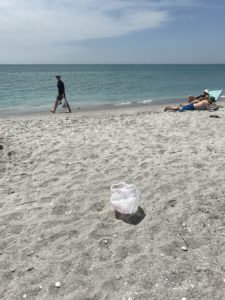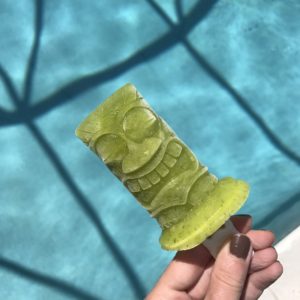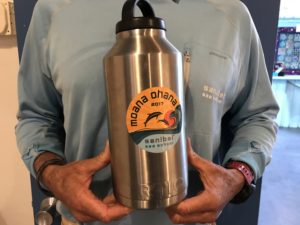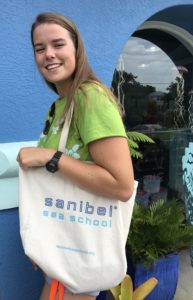28 Jul Join Plastic Free July and Help Wildlife Thrive
provided by Sanibel Sea School
Visit Website | PH: 239-472-8585 | 455 Periwinkle Way, Sanibel
Improving the Ocean’s Future One Person at a Time
You’ve probably heard by now that single-use disposable plastics are harmful to our oceans.

We found this plastic bag floating along the beach on Captiva (and picked it up after we took a photo)
Even if items like plastic water bottles, shopping bags, and straws are placed in trash or recycling receptacles with the best of intentions, a significant portion make their way to the sea due to environmental factors (e.g. wind) and human error. In some developing countries, lack of waste infrastructure means that garbage, including plastic, is dumped directly into the ocean.
The problem has become so acute that enormous gyres of marine debris exist in multiple areas of the ocean. The largest, located in the North Pacific, is about the size of Texas. In many places, scientists routinely find more plastic than plankton in the water. Sea creatures including birds, turtles, fish, and marine mammals often become entangled in plastic debris, and many confuse smaller pieces of plastic with food. Microplastics, plastics that have broken apart into very small pieces, accumulate up the marine food web and have been identified in numerous types of seafood. Yes, you’re probably eating a tiny bit of plastic with your fish and chips.
The good news is that communities around the world, including Sanibel, are becoming more aware of the environmental issues associated with plastics, and there are simple things we can do as citizens to reduce our individual contribution to the problem. Number one is eliminating single-use disposable plastics – the plastics we use for just a few minutes before throwing them away. Plastic Free July is a global effort by marine conservation organizations to educate the public about alternatives to single-use disposable plastics. Here are a few of our favorite options, tested and approved by Sanibel Sea School staff members. Will you join us in making a few small changes for our beloved blue planet?
1. Trade disposable plastic water bottles for a reusable water bottle. In addition to being harmful to the environment, plastic water bottles contain chemicals that may be bad for human health. Our favorite brand of reusable bottles is Hydroflask (hydroflask.com). They are well-designed, come in a variety of styles, will keep your drink cold (or warm) for many hours, and are easy to clean. We have a Brita filter attachment on our sink, so we can easily fill our Hydroflasks with fresh, clean water every day.
2. Purchase canvas reusable grocery shopping bags, and say no to plastic bags. The average plastic shopping bag is used for 12 minutes before it is thrown in the garbage. Canvas bags are washable, stylish, and easy to carry. Having trouble remembering your bags? Pledge to “go commando” and refuse a bag the next time you forget them. We promise, loading items one by one into your back seat will help you remember!
3. Refuse a straw. If you must have one, there are plenty of reusable metal, glass, and even bamboo options available online.
4. Try Beeswrap instead of plastic wrap. Made of beeswax-coated cloth, these are one of our favorite recent discoveries. They work just as well as plastic wrap (we promise), are easy to wash, and last for a year or longer.
5. Make your own popsicles. Instead of buying icy cold treats wrapped in plastic, purchase a popsicle tray and make your own. There are endless recipes available on the internet, and many are healthier than store-bought options. Going green can be fun and delicious!
- Making your own Popsicle reduces wast and tastes great
- Reusable bottles can keep your drink cold for many hours
- Canvas totes are great for carrying groceries and other purchased items






Sorry, the comment form is closed at this time.